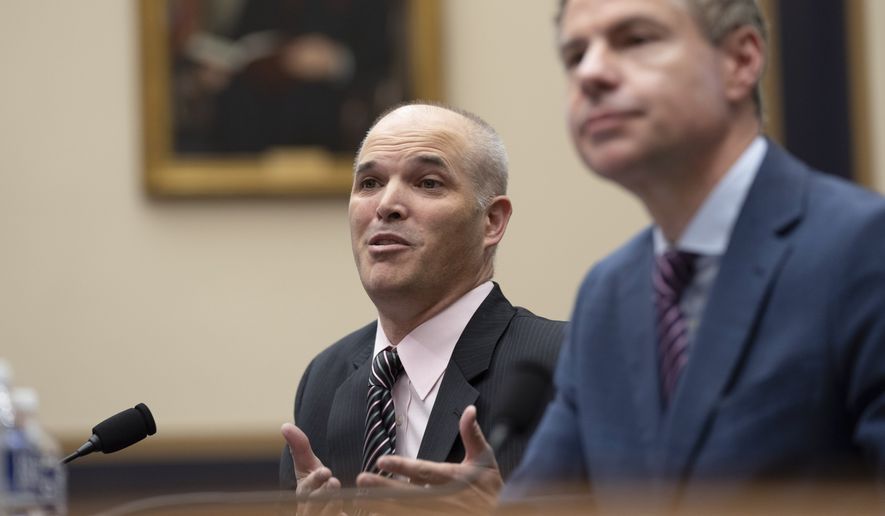The IRS, bloodied by bad press, promised Monday to reverse course and stop sending officers to make surprise house calls to collect unpaid taxes from Americans.
Commissioner Danny Werfel said tens of thousands of home visits each year made a bad impression. The tax agency is trying to rebrand itself as friendlier to the average taxpayer while getting tougher on big-dollar tax cheats.
He said scammers posing as revenue officers confused taxpayers and his employees were increasingly facing thorny situations where they were sent to knock on taxpayers’ doors.
“We are taking a fresh look at how the IRS operates to better serve taxpayers and the nation, and making this change is a common-sense step,” Mr. Werfel said.
The IRS faced questions for sending an officer to knock on the door of journalist Matt Taibbi late last year. It was the same day he was testifying to Congress about the government’s use of social media platforms to censor Americans.
According to a congressional investigation, the IRS officer pored over Mr. Taibbi’s voting records and looked into whether he had a concealed weapons permit and a hunting or fishing license before making the house call.
Mr. Taibbi was able to resolve the issue easily, didn’t owe the IRS anything and in fact was due a “substantial refund,” according to congressional Republicans who investigated the incident.
They called it another example of an overbearing tax agency manhandling innocent citizens.
The IRS says officers made home visits only after notifying taxpayers of unpaid taxes or unfiled returns. Mr. Taibbi said he never received a notice before the visit.
On Twitter, Mr. Taibbi credited Rep. Jim Jordan, Ohio Republican, for pressing the issue and forcing the IRS’s retreat.
“The IRS shouldn’t be making surprise visits,” he said.
Mr. Werfel insisted Monday that the policy to send officers on home visits is long-standing but said the retreat is needed as the IRS tries to regain Americans’ confidence.
The new policy eliminates “most” home visits. The only exceptions will be cases where officers try to seize assets or serve subpoenas.
The agency said the exceptions will total “less than a few hundred each year.” By contrast, revenue officers currently make “tens of thousands of unannounced visits.”
The policy applies to revenue officers, who are the agency’s debt collectors. They are not armed, and they work alongside revenue agents on civil enforcement to collect what the IRS says is owed.
Instead of home visits, revenue officers will send letters to schedule appointments.
“These visits created extra anxiety for taxpayers already wary of potential scam artists,” Mr. Werfel said. “At the same time, the uncertainty around what IRS employees faced when visiting these homes created stress for them as well. This is the right thing to do and the right time to end it.”
The agency counts about 2,300 revenue officers.
The policy does not affect the work of the IRS’s special agents, who are armed investigators and pursue criminal cases of major tax evasion or money laundering. It was criminal agents who made the case against Hunter Biden.
Revenue agents, the IRS employees who conduct audits, already schedule appointments before visiting a taxpayer’s home or business.
Rep. Jason Smith, chairman of the House Ways and Means Committee that oversees the IRS, said banning home visits was small potatoes, given the IRS’s problems.
He pointed to recent revelations that the government gave a heads-up to Hunter Biden’s lawyers before IRS agents were scheduled to visit him to gather evidence of tax crimes.
“Tax enforcement that goes after families and small businesses, but tips off President Biden’s family, sounds like it has bigger problems in how it investigates tax crimes,” said Mr. Smith, Missouri Republican.
But the National Treasury Employees Union cheered Mr. Werfel’s decision. It said IRS employees face a growing level of danger. The union blamed “false, inflammatory rhetoric” for the animosity toward the IRS.
The IRS has been given tens of billions of dollars to squeeze more money out of taxpayers.
Biden administration officials say they will begin by targeting high-income taxpayers who they suspect are not paying all they owe.
The IRS has been coy about what happens down the road. The agency has said it won’t increase the audit rate for average taxpayers above “historical” levels but won’t say what the benchmark is.
That matters.
A taxpayer with $50,000 to $100,000 in annual income had a 1 in 1,000 chance of being audited as of the most recent calculations in 2019. The audit rate was five times higher in 2015 and seven times higher in 2010.
• Stephen Dinan can be reached at sdinan@washingtontimes.com.




Please read our comment policy before commenting.